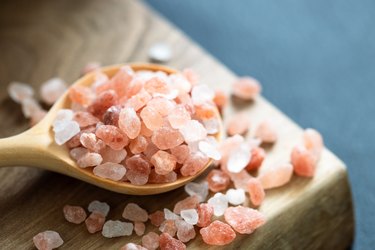
With its thick pink crystals, Himalayan sea salt is attractive and fun to grind over the foods you prepare. You may have heard it touted as a healthier alternative to regular table salt, especially for those with high blood pressure. But are there any blood pressure benefits to these pink crystals?
Read more: What Are the 84 Minerals in Himalayan Salt?
Video of the Day
Video of the Day
Blood Pressure and Sodium
According to the Centers for Disease Control and Prevention (CDC), nearly half of American adults have high blood pressure, also called hypertension. Uncontrolled hypertension can lead to various health problems including stroke, heart attack, heart failure, metabolic syndrome, aneurysm, weakened blood vessels in the kidneys and dementia, per the Mayo Clinic.
A blood pressure reading of less than 120 millimeters of mercury (mm Hg) systolic and 80 mm Hg diastolic (or "120 over 80") is considered normal, says the CDC. High blood pressure has two stages:
- Stage 1: 130-139 mm Hg systolic and 80-89 mm Hg diastolic.
- Stage 2: over 140 mm Hg systolic and over 90 mm Hg diastolic.
While age increases your risk of higher systolic blood pressure, per the American Heart Association (AHA), the ranges that define hypertension don't change by age.
There are a number of dietary means of controlling high blood pressure, and chief among them is reducing your sodium intake. According to the AHA, sodium pulls water into your bloodstream, which places extra pressure on the interior walls of your blood vessels. Therefore, scaling back on sodium in your food can help keep this pressure to a minimum.
Himalayan Salt vs. Other Salts
Are there nutrition benefits to consuming Himalayan salt compared to other salts? Not really. All salt is composed of the molecules sodium and chloride, and according to information supplied by the USDA, Himalayan salt, sea salt and table salt are all zero-calorie foods.
As for sodium content, brands may vary, but according to the USDA, Himalayan sea salt and Atlantic sea salt contain comparable amounts. However, Himalayan salt may contain less sodium than table salt — in some cases, up to 200 milligrams less per serving. This may allow you to sprinkle more Himalayan salt onto your food for less total sodium.
It is also true that, compared to table salt, Himalayan sea salt contains slightly higher amounts of certain micronutrients. Per Kris Sollid, RD, dietitian and senior director of nutrition communications for the Washington, D.C.-based International Food Information Council, Himalayan sea salt boasts more calcium, iron, magnesium and potassium than table salt. But this isn't necessarily reason enough to pay extra for the pink stuff.
"The micronutrient differences between types of salt are small, and their resulting impact on health is insignificant," he says.
Himalayan Sea Salt Benefits
In addition to its lower sodium content, you may have heard buzz that Himalayan sea salt has lots of additional health benefits as well. The internet is filled with claims that Himalayan sea salt can do things such as balance the body's pH levels, regulate blood sugar, improve sleep and more.
However, Sollid takes issue with these lofty promises. "Claims across the internet do not always align with established evidence from decades of published scientific literature. There is no research to support the claim that Himalayan salt is more beneficial to health than table salt," he says.
All told, Himalayan sea salt doesn't have any magical properties for lowering blood pressure. "If you have hypertension, the amount of sodium you consume is more important than what part of the world it comes from," Sollid says. The AHA recommends consuming less than 2,300 milligrams of sodium per day, with an ideal limit of 1,500 milligrams per day for those with hypertension.
Read more: Salt and Your Blood Pressure: What You Need to Know
- Centers for Disease Control and Prevention: “Facts About Hypertension”
- Mayo Clinic: “High Blood Pressure (Hypertension)”
- American Heart Association: “Understanding Blood Pressure Readings”
- USDA FoodData Central: “Himalayan Salt”
- USDA FoodData Central: “Sea Salt”
- USDA FoodData Central: “Salt, Table”
- Kris Sollid, RD, dietitian, senior director of nutrition communications, International Food Information Council, Washington, D.C., and president, D.C. Metro affiliate, Academy of Nutrition and Dietetics
- American Heart Association: “Get the Scoop on Sodium and Salt"
Is this an emergency? If you are experiencing serious medical symptoms, please see the National Library of Medicine’s list of signs you need emergency medical attention or call 911.